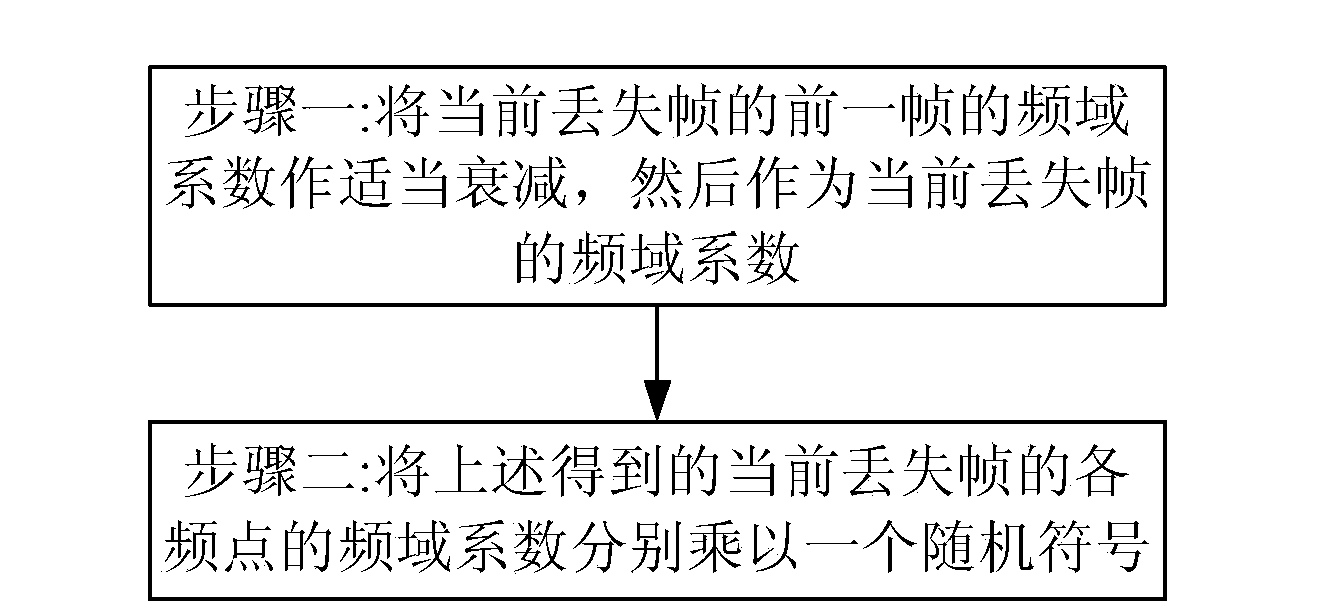Frame loss compensation method and frame loss compensation device for transform domain
A compensation method and transform domain technology, which is applied in the field of speech and audio coding and decoding, can solve the problems that most of the frame loss compensation technology has no obvious effect, high computational complexity, and poor signal compensation effect, etc.
- Summary
- Abstract
- Description
- Claims
- Application Information
AI Technical Summary
Problems solved by technology
Method used
Image
Examples
Embodiment 1
[0175] As shown in FIG. 2(A), the frame loss compensation method in the transform domain of this embodiment includes:
[0176] Step 101: Use the frequency domain coefficients of the previous frame or several frames of the current lost frame to calculate the frequency domain coefficients of the current lost frame, and perform frequency-time domain transformation on the calculated frequency domain coefficients to obtain the initial compensation of the current lost frame Signal;
[0177] The number of frames is two or more frames.
[0178] Step 102: adjusting the waveform of the initial compensation signal to obtain the compensation signal of the current lost frame;
[0179] Step 101 and step 102 will be specifically described below in conjunction with the accompanying drawings.
[0180] As shown in Figure 2 (B), the specific methods for calculating the frequency domain coefficients of the current lost frame include:
[0181] Step 1: Appropriately attenuate the frequency domai...
Embodiment 2
[0239] Step 201: Obtain the phase and amplitude of each frequency point of several frames before the current lost frame, and use the phase and amplitude of each frequency point of several frames before the current lost frame to linearly or nonlinearly extrapolate to obtain the phase of each frequency point of the current lost frame and amplitude, the frequency domain coefficients of each frequency point of the current lost frame are obtained through the phase and amplitude of each frequency point of the current lost frame;
[0240] Step 202: Obtain the current frame loss compensation signal through frequency domain-time domain transformation.
[0241] Such as Figure 5 , in step 201, if the frequency domain representation of each information frame in the codec is in the MDCT domain, then it is necessary to use MDST (modified discrete sine transform) to construct the complex signal of the MDCT-MDST domain of several frames before the current lost frame , the method in step 201...
Embodiment 3
[0260] Through the judgment algorithm, choose to use the method of embodiment 1 or embodiment 2 to compensate the current lost frame.
[0261] Such as Figure 6 As shown, the judgment algorithm includes:
[0262] Step 301: Calculate the spectral flatness of each frame, judge whether the value of spectral flatness is less than the tenth threshold K, if less than K, then consider that the frame is a tone frame, and set the frame type identification bit as tone type (for example, 1); If not less than K, then think that this frame is non-tone frame, set frame type identification bit as non-tone type (for example be 0), wherein 0≤K≤1;
[0263] The calculation method of specific spectral flatness is as follows:
[0264] The spectral flatness SFM of any i-th frame i Defined as the ratio of the geometric mean to the arithmetic mean of the amplitude of the signal in the transform domain of the i-th frame signal:
[0265] SFM i = ...
PUM
 Login to View More
Login to View More Abstract
Description
Claims
Application Information
 Login to View More
Login to View More - R&D
- Intellectual Property
- Life Sciences
- Materials
- Tech Scout
- Unparalleled Data Quality
- Higher Quality Content
- 60% Fewer Hallucinations
Browse by: Latest US Patents, China's latest patents, Technical Efficacy Thesaurus, Application Domain, Technology Topic, Popular Technical Reports.
© 2025 PatSnap. All rights reserved.Legal|Privacy policy|Modern Slavery Act Transparency Statement|Sitemap|About US| Contact US: help@patsnap.com



